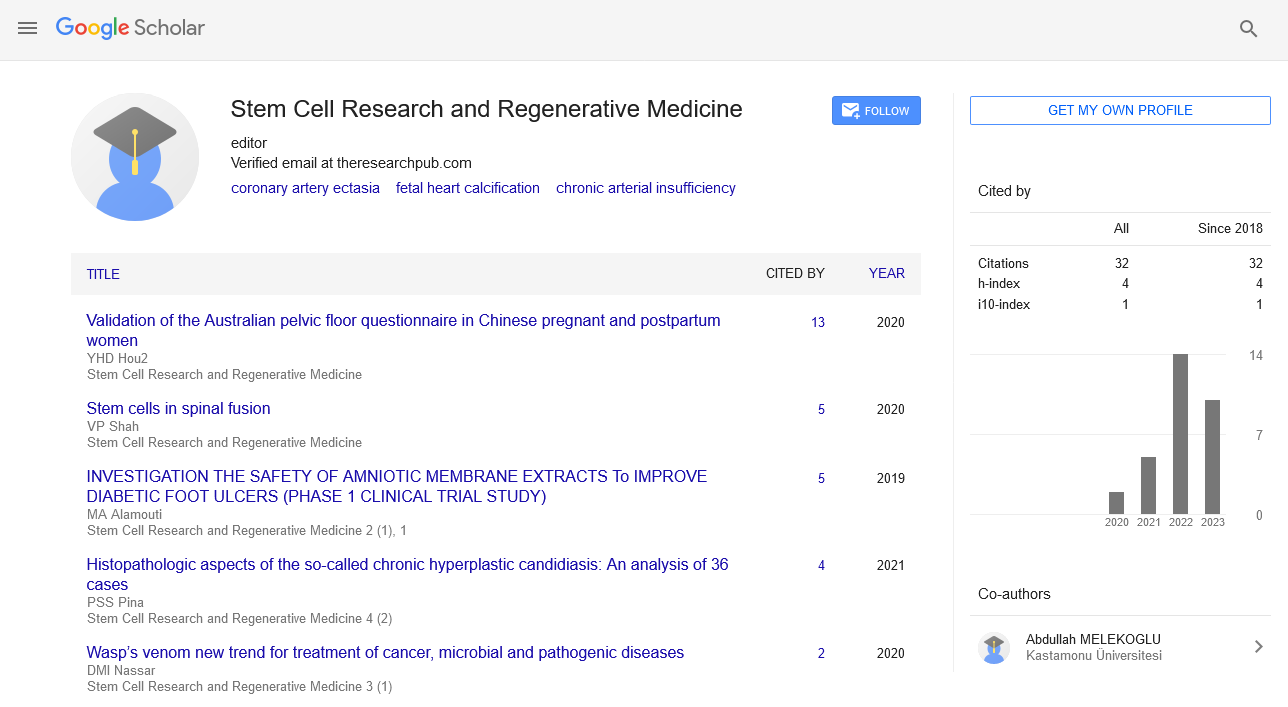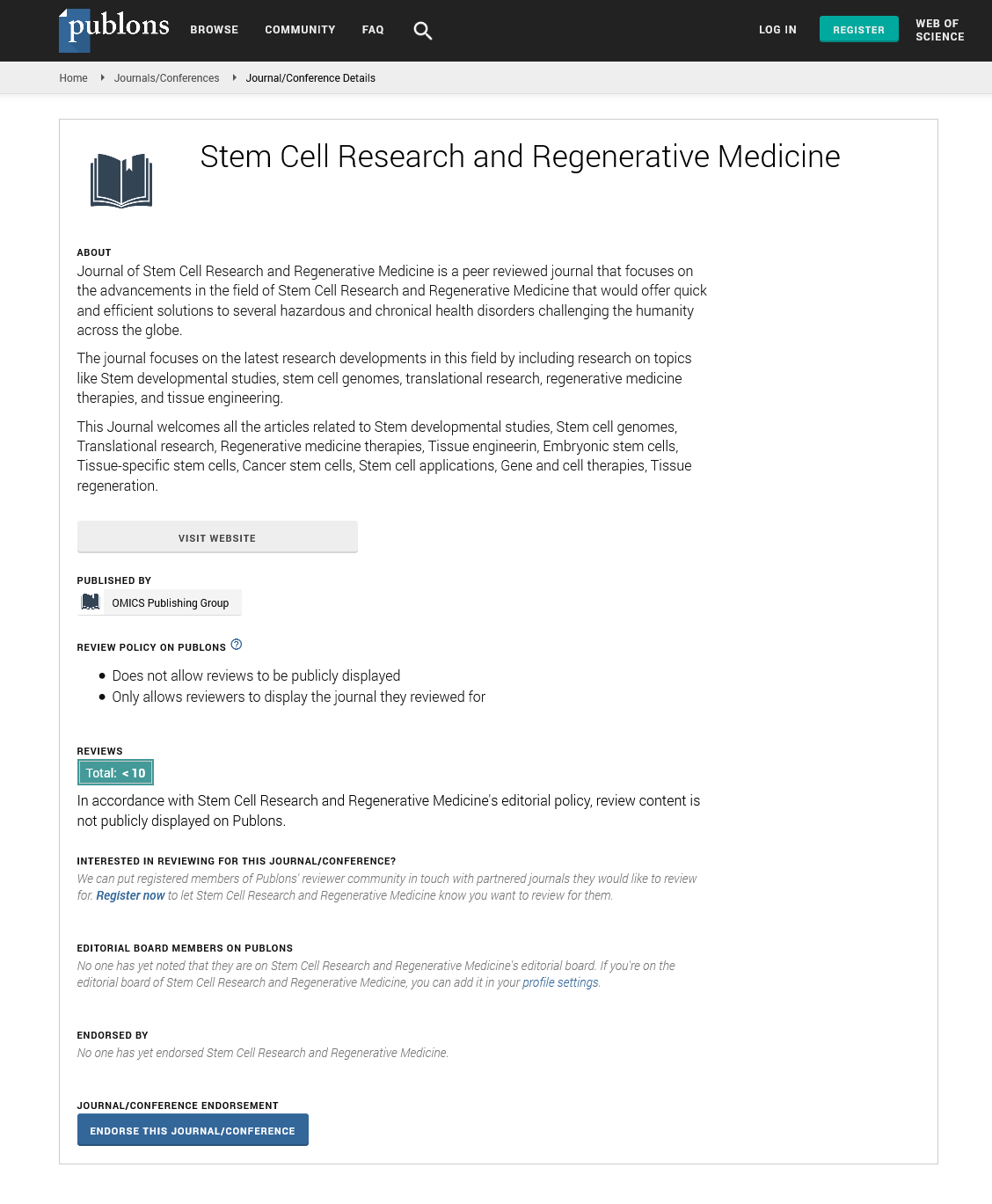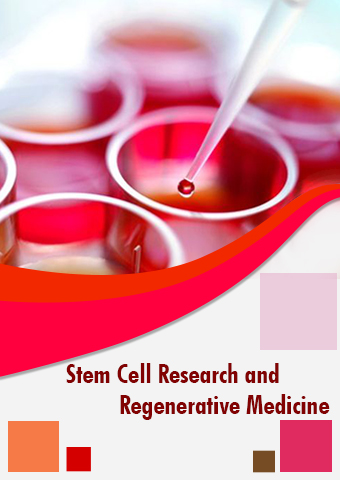Perspective - Stem Cell Research and Regenerative Medicine (2024) Volume 7, Issue 5
The Role of Stem Cells in Cancer Treatment: Double-Edged Sword?
- Corresponding Author:
- Brodeur Alyssa
Department of Surgery,
Laval University,
Quebec City,
Canada
E-mail: alyssabrodeur@gmail.com
Received: 01-Oct-2024, Manuscript No. SRRM-24-149854; Editor assigned: 03-Oct-2024, Pre QC No. SRRM-24-149854 (PQ); Reviewed: 17-Oct-2024, QC No. SRRM-24- 149854; Revised: 21-Oct-2024, Manuscript No. SRRM-24-149854 (R); Published: 31-Oct-2024, DOI: 10.37532/SRRM.2024.7(5).260-262
Introduction
Cancer remains one of the most formidable health challenges of our time, claiming millions of lives globally each year. Traditional treatments, such as chemotherapy, radiation, and surgery, have made significant strides in managing various cancers, but they often come with considerable side effects and limitations. In recent years, stem cells have emerged as a promising tool in cancer treatment, offering innovative approaches to therapy. However, the role of stem cells in oncology is complex and multifaceted, often viewed as a double-edged sword. This article explores the potential benefits and risks of utilizing stem cells in cancer treatment, examining their impact on patient outcomes and the ethical considerations surrounding their use.
Description
Understanding stem cells in cancer treatment
Stem cells are unique in their ability to differentiate into various cell types and self-renew, making them invaluable in regenerative medicine. In the context of cancer treatment, stem cells can be categorized into two main roles: As a source of new therapies and as targets for treatment.
Hematopoietic Stem Cell Transplantation (HSCT)
One of the most established applications of stem cells in cancer treatment is Hematopoietic Stem Cell Transplantation (HSCT), often used in the treatment of hematological malignancies such as leukemia and lymphoma. In this procedure, patients receive high doses of chemotherapy or radiation to eliminate cancerous cells, followed by the infusion of healthy hematopoietic stem cells. These stem cells can regenerate the patient’s blood and immune system, facilitating recovery and improving survival rates. HSCT has been successful in treating certain types of blood cancers, offering hope to patients with otherwise poor prognoses.
Mesenchymal Stem Cells (MSCs) in cancer therapy
Mesenchymal Stem Cells (MSCs) are another type of stem cell that has garnered attention in cancer research. MSCs have immunomodulatory properties, meaning they can influence the immune response. Some studies suggest that MSCs can enhance the effectiveness of cancer treatments by promoting immune cell activation and improving the anti-tumor response. Furthermore, MSCs can be engineered to deliver therapeutic agents directly to tumors, potentially increasing treatment efficacy while minimizing damage to surrounding healthy tissues.
Cancer Stem Cells (CSCs) as therapeutic targets
A major challenge in cancer treatment is the existence of Cancer Stem Cells (CSCs), a subpopulation of cells within tumors that possess stem cell-like properties. CSCs are thought to be responsible for tumor initiation, metastasis, and resistance to conventional therapies. Targeting CSCs has emerged as a promising strategy to improve cancer treatment outcomes. Researchers are exploring various approaches, including targeted therapies and immunotherapy, to eliminate CSCs and prevent tumor recurrence.
Benefits of stem cells in cancer treatment
The use of stem cells in cancer treatment offers several potential benefits, making them a valuable tool in oncology.
Improved treatment outcomes
Stem cell-based therapies, such as HSCT, have been shown to improve treatment outcomes for certain blood cancers. By restoring the immune system and replenishing healthy blood cells, HSCT can enhance the patient’s ability to fight cancer and reduce the risk of relapse. For patients with hematological malignancies, HSCT can offer a chance for long-term survival and potentially a cure.
Targeted delivery of therapies
The ability of MSCs to home in on tumor sites presents a unique opportunity for targeted therapy. By engineering MSCs to deliver chemotherapeutic agents or other therapeutic molecules directly to tumors, it may be possible to increase treatment efficacy while reducing the side effects associated with traditional therapies. This targeted approach could improve patient quality of life and enhance treatment outcomes.
Enhanced immune response
MSCs have the potential to enhance the immune response against tumors, providing an additional layer of defense against cancer. By modulating immune cell activity and promoting the activation of anti-tumor T cells, MSCs could play a role in improving the effectiveness of immunotherapies. This dual action targeting the tumor and boosting the immune system could lead to better overall outcomes for patients.
Risks and ethical considerations
Despite the potential benefits, the use of stem cells in cancer treatment is fraught with risks and ethical dilemmas that must be carefully considered.
Tumorigenicity and malignancy risk
One of the primary concerns regarding stem cell therapies is the risk of tumorigenicity. The very properties that make stem cells valuable such as their ability to proliferate and differentiate also raise concerns about the potential for uncontrolled growth and tumor formation. In particular, the use of embryonic stem cells and certain types of induced Pluripotent Stem Cells (iPSCs) may pose higher risks of malignancy. Ensuring the safety of stem cell therapies is paramount to preventing unintended consequences in patients.
Immunogenic reactions
The use of allogeneic stem cells (cells derived from a donor) can lead to immunogenic reactions in the recipient. The patient’s immune system may recognize the transplanted cells as foreign and mount an immune response, potentially leading to Graft-Versus-Host Disease (GVHD). This condition can cause severe complications, making it crucial to match donors and recipients closely and monitor patients closely for signs of immune rejection.
Ethical issues surrounding stem cell research
The use of embryonic stem cells and the sourcing of stem cells for research and therapy raise ethical concerns related to the moral status of embryos and consent issues. The debate over embryonic stem cell research has sparked significant ethical discussions regarding the balance between scientific advancement and respect for human life. Additionally, issues of informed consent, particularly in vulnerable populations, must be addressed to ensure that patients fully understand the risks and benefits of stem cell therapies.
Access and equity issues
As with many advanced medical treatments, access to stem cell therapies may be limited by socioeconomic factors. The high costs associated with stem cell treatments can create disparities in access, leaving some patients without the option of potentially life-saving therapies. Efforts must be made to address these disparities and ensure that all patients have equitable access to stem cell treatments, regardless of their financial situation.
Conclusion
The role of stem cells in cancer treatment presents a promising yet complex landscape, characterized by both potential benefits and significant risks. While stem cell therapies, such as HSCT and MSC-based treatments, offer new avenues for improving cancer outcomes, the associated risks of tumorigenicity, immunogenic reactions, and ethical dilemmas must be carefully navigated.
As research in this field continues to advance, it is crucial to establish rigorous safety protocols, ethical guidelines, and equitable access strategies. By addressing these challenges, the medical community can harness the power of stem cells in cancer treatment while ensuring the safety and well-being of patients. Ultimately, the potential of stem cells to revolutionize cancer therapy lies in a balanced approach that emphasizes innovation, ethics, and patient-centered care.


